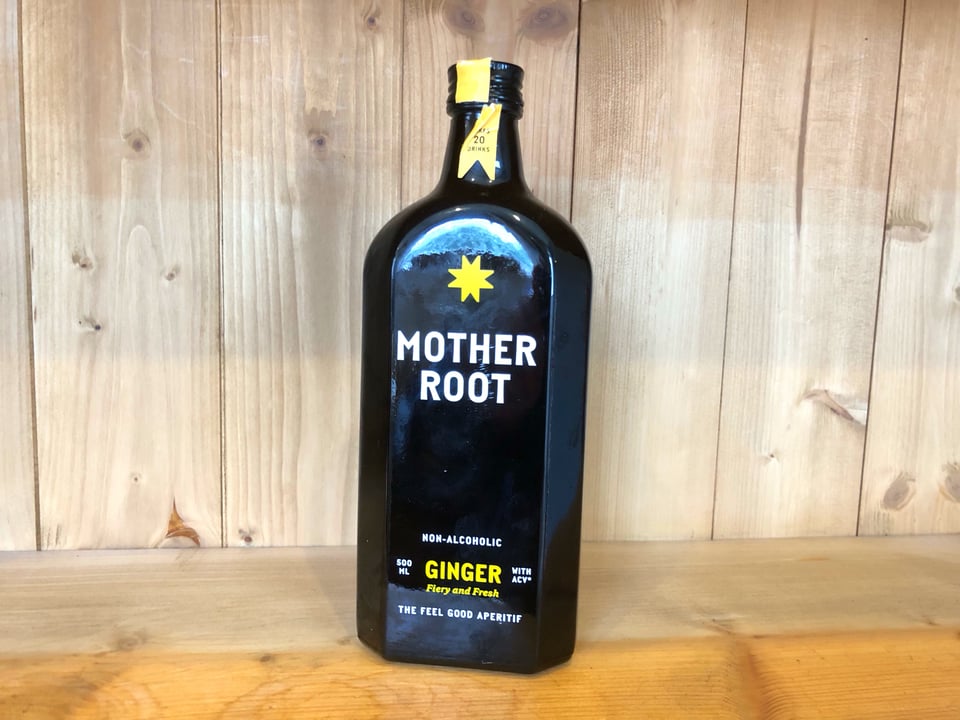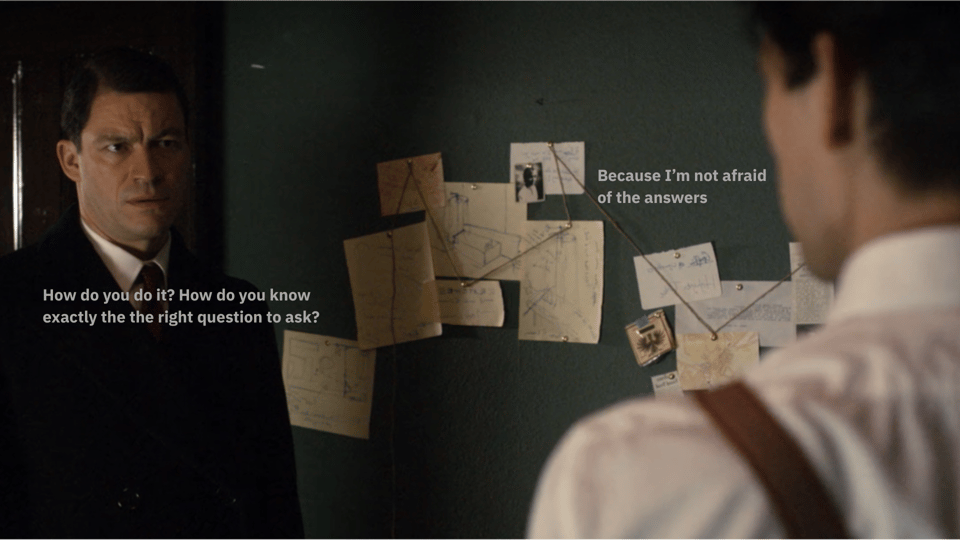The hole that is in their soul
A post about good questions.
Tell me what you bought
I had an interview last week and I think it went well.
It was also slightly strange. I’m usually the one asking the questions. It’s usually me trying to find out what a customer likes about a product. This time I was on the receiving end. I was the customer. I was the interviewee.
I bought a bottle of Mother Root (non-alcoholic ginger aperitif) and signed up to its newsletter, mainly to get a discount code for the next bottle. Shortly afterwards, their COO sent me an email asking if I’d be happy to talk to her for half an hour. I agreed, mainly because I was interested in how she would structure the interview. Maybe there’d be some questions I could nick for my own work. I’m a question nerd. I’m a collector. She didn’t disappoint.
After the pleasantries, she launched straight in with:
In your own words, tell me what you bought*.
I think I smiled in appreciation. I definitely smiled in my mind. It’s a deceptively simple question. Its power lies in what it doesn’t ask. It doesn’t explicitly ask what Mother Root is. It makes a point of not asking what Mother Root is, although you can answer that way if you want to. The straightforward answer - a non-alcoholic ginger aperitif - is acceptable. But the phrasing of the question makes it obvious that the door is open to a more revealing conversation. I love it when people know what they’re doing.
It’s a Jobs To Be Done question. It’s a Category Entry Point question.
(*Yeah, yeah, technically it’s an instruction, not a question.)
We were straight into a conversation about the lack of decent non-alcoholic alternatives to alcohol-free beer. How there are some very good alcohol-free beers, but alcohol-free wine is godawful. And, apart from beer, any non-alcoholic “adult” drink with a half-decent taste will be loaded with sugar. You have to trade one poison for another. Mother Root has lots of zing but hardly any sugar. So what I bought from them is a fabulous alternative to alcohol-free beer. I bought some no-compromise variety.
Good question.

Revelations
Revelation is a better word than insight. The whole idea of insights has been devalued by overuse, misuse, and cheap intellectual knock-offs. A true insight should be more than just a useful fact, which is not to downplay the importance of useful facts in our work. Useful facts that don’t pretend to be insights are the foundation for many great campaigns.
And revelation is a pretty-much perfect description of brand strategy done well. I mentioned Michael Wolff’s book, Leap Before You Look, in my last post. He talks about the revelatory nature of brand strategy. He talks about it so poetically, in fact, that I’m going to quote him twice:
When Wally and I led Wolff Olins, we never intended to glorify corporations or national institutions at the expense of the rest. We set out to reveal what was already there and connect it to a fruitful and generous future.
Michael Wolff, Leap Before You Look
I've always aspired to find an authentic expression of my clients’ enterprises, and to do it in a way that they might well have chosen had they had the ability to see themselves through the eyes of others and the skills of an interpretive and sympathetic designer.
Michael Wolff, Leap Before You Look
To do this well - to be an effective revealer - you need a good ear and a good nose. If you’re looking to reveal the innate truth of a brand, you need to ask good questions, listen really well, and have a good nose for where the answer lies in amongst everything that people tell you. The graphic below is a useful reminder of the order in which various organs should be used for brand strategy. Engage ear, nose, and brain before opening mouth to give advice.

Two lines of questioning
If revelations are the goal, we need two things to happen in an interview. First and foremost we need revealing answers to well-framed questions. But that only happens in an atmosphere of rapport, ideally an atmosphere of intimacy. So there’s another type of question that builds connection and trust. It’s a line of questioning that demonstrates the sincerity of your interest, that shows your sensitivity to their feelings, and that makes them feel valuable. You can only be good at this line of questioning if your interest is sincere, if you are sensitive to the feelings of your interviewee, and if you truly believe them to be valuable. You can’t fake your way to intimacy in an interview situation.
This doesn’t have to be difficult. You just have to care. And you have to be patient. I might start a conversation with a company founder with questions like these:
How did you come up with the company name?
What was it like in the early days?
What have been the biggest changes between then and now?
What do you miss about those times?
Questions like these are non-threatening and they’re an invitation to tell stories. And these stories tell you a lot about the values of the person you’re talking to. More importantly, these questions and stories take the conversation into an unguarded space, which is what you need for revelations.
I got lucky recently when the answer to a project fell into my lap towards the end of a stakeholder interview. (Although I like to think that I made my own luck.) We’d struck up a good rapport, to the extent that the interviewee was comfortably sharing off-piste stories and anecdotes. Sometimes you have to rein an interviewee in when this happens. On this occasion I let it roll. When “the answer” came, it wasn’t in direct response to a question. It was a relaxed, almost throwaway comment, 52 minutes into a 57 minute conversation. Bingo! Intimacy is the mother of revelation.
The hole that is in their soul (intimacy is a craft skill)
I like the style of Nonfiction Research.
In this podcast interview, Nonfiction co-founder, Gunny Scarfo, talks about an aptitude for intimacy being one of their recruitment criteria. Is someone able to feel what another person feels? How good are they at quickly establishing intimacy with a total stranger?
Nonfiction conducts its own unfunded research projects, one of which is titled “Intimacy in America”. I doubt it’s a coincidence that they chose to study this topic. They spoke to a wide sample of American citizens and found a country that was feeling starved of meaningful connection. But the fieldwork also took in interviews with intimacy professionals, including male and female escorts. In the podcast, Scarfo talks about a conversation with a female escort which happened on a rarefied plane because of the trust and intimacy that had been established.
She got to a point in that conversation, she was so comfortable, and she was able to access something inside of herself that she didn't know was wisdom until she said it and it was brilliant… And in that was a recipe for all of human communication, all of intimacy. And of the intimacy experts we spoke to, none of them put it that way.
Gunny Scarfo, Nonfiction Research, Strategy & Leadership podcast, 2nd October 2020
This is what she said:
You have to be able to see inside of somebody else. You have to be able to see the hole that is in their soul, and you have to recognise how to fill that by listening to them and by receiving them.
Female escort respondent, Intimacy in America by Nonfiction Research
Burning questions
This didn’t start as an advert for Nonfiction Research, but it’s turning into one. Sorry. Did I mention that I like their style? I do love it when people know what they’re doing.
Nonfiction client projects revolve around a “Burning Question” that has to satisfy several stringent criteria to be worthy of the name.
We always begin with what we call a burning question. And the burning question is something that both we or the client don't know, which sounds obvious, but you'd be surprised how people want to study things they already know. So we both don't know it. And if we knew the answer, it would help the cause or the business. And so it needs to be both useful and inspiring. We put it through the wringer to get to something that feels like it doesn't have any assumptions. It's written in very plain spoken language. There's not any jargon or abbreviations and it feels exciting. When you look at a burning question, it should feel the way it feels when you hit a great strategy, like that's something I want to go devote 10 to 12 weeks of my life to.
Lindsey Wehking, CSO, Nonfiction Research, On Strategy Showcase
Scarfo gives an example of a Burning Question in an interview with Peter Spear. Nonfiction worked with a division of Disney that’s responsible for behind-the-scenes educational experiences for schools. The client had realised that many of the teachers that had been bringing kids on school trips year after year were getting older and would be leaving the profession in the near future. What to do?
After spending “a dumb amount of time” to distil and hone, this is the useful, revelatory, assumption and jargon-free burning question that defined the project:
What do 20-something-year-old teachers truly want out of field trips and how could Disney provide something that no one else could?
It’s another deceptively simple question. Its power lies in where it leads. Like the Mother Root question, it’s an invitingly open door. As Scarfo says…
It’s a great burning question. Now we can go drive around the back roads of Georgia and Florida to spend time in teacher lunchrooms. We can find the forms that teachers use to request field trips from principals. We can interview kids, parents, chaperones. We went to these sessions that private parochial schools used to basically sell parents on the school. We saw how field trips were used in those presentations sometimes.
And we ended up coming back with some counterintuitive findings that Sean [Disney client], who is amazing at starting research and turning research into insights that change a business, transformed into something that today is called Disney Imagination Campus and has a gazillion kids go through every year, learning STEM, leadership, incredible stuff that is super relevant to the teachers, young and old, that want to bring their kids to Disney.
Gunny Scarfo, Nonfiction Research, That Business of Meaning
Ok, last plug for Nonfiction coming up, I promise. But Scarfo captures in this last quote the power and importance of a well-framed question. A good question is the antidote to, or a vaccine against, mediocrity.
If there's no burning question, there's nothing for us to do, and we turn down research all the time, not out of some nobility or because we're too cool, but because it's going to lead to mediocre work. I think most of the mediocre insights that you see in business come from not bad researchers or faulty techniques or you need an edgier technique, just the question itself was destined to lead you to mediocrity. The biggest predictor of quality insights that you can use to reach and move real people is the quality of the question.
Gunny Scarfo, Nonfiction Research, Strategy & Leadership podcast, 2nd October 2020
Selling questions
Ethical selling is a service to the buyer. And a service you can provide, whether you land the deal or not, is to help your prospect truly understand the problem that they are looking to solve. Sometimes, while framing the problem in these early conversations, it becomes apparent that you are not the solution. In which case, no sale; but your reputation is enhanced. On other occasions, co-defining the problem with a prospect is the best way to show that you get them. And it allows them to get you. And it becomes obvious that you are the solution and the sale is a shoe-in without ever doing any actual “selling”.
Once again the questions aren’t difficult as long as you approach these conversations with the right mindset: namely empathy and ambivalence.
How do you know, or what makes you think, you have a problem? What are its symptoms?
What are the root causes behind these symptoms?
What are the root causes behind these root causes?
What is making this a “now” problem?
What will happen if you don’t solve it?
What won’t happen if you don’t solve it?
What will and won’t happen if you do solve it?
How will things change for you personally if the problem is successfully solved?
If you make each sales conversation a quest to mutually arrive at a clear, commercially valuable definition of the problem to be solved, then everyone’s a winner even if it doesn’t result in a deal.
The person behind the answer
I wasn’t joking when I said I collect good questions. And one of my favourite categories is interview questions. More specifically, what are the questions that people ask to test whether a candidate is a good fit for values and culture?
There’s a subtle but important difference between knowing what you’re doing and knowing what you’re about. If you know what you’re about, you know what to look for in new recruits, and you can ask questions that are designed to reveal the right qualities. One of my favourites is this from Jet Blue airlines:
One of the questions we ask in the interview process is, 'In your career, in your life, can you give us some examples of where you left your area of responsibility and helped somebody else out in another area?'... We didn't hire a pilot that had 15,000 hours, and he called me up screaming, 'I can't believe you wouldn't hire me. I'm an experienced pilot.' So I went to the interviewers, and they said, 'Well, he couldn't come up with one single example of anything he's ever done to help anyone other than himself.' So, you know, it was a cultural thing.
Dave Neeleman, Founder, Jet Blue Airways, How I Built This podcast.
It’s good interview practice to establish rapport with a potential employee. That’s obvious. It’s also good practice to ask questions that reveal someone’s character and values. That’s not so obvious. I always ask my clients if they have standard compatibility questions for recruitment interviews. Most don’t. The ones that are most protective of culture sometimes do.
For example, one of my clients was a consulting firm with specialised technical expertise. They have to pitch their advice to clients who have a lower level of knowledge than them, in a way that the client can understand and act upon. So when they interview graduates they ask them to explain their dissertation project to a layperson. It’s a test of technical knowledge, audience empathy, and the ability to communicate simply and clearly. You need all three of those skills to get hired.
What about hiring at the top? What’s a revealing question to ask a potential board member or CEO? According to strategy sage, Roger Martin, it’s something like this:
Tell me a time when you've had to go against the conventional wisdom and the norms of the group to make sure a point of view that you think is important prevails.
Roger Martin, Nurole podcast
He’s testing for constructively contrarian points of view and a preparedness to go out on a limb, maybe even to die on a hill for them. In Martin’s opinion, a good CEO is a boat-rocker.
For more good questions, including “the most important question in strategy,” you might want to read Martin’s post about strategy questions.
I’m not afraid of the answers
I watched The Hour on Netflix recently. It’s fabulous if, like me, you managed to miss it thirteen years ago.
The Hour is a fictional series set in the Fifties. The BBC launches a new weekly current affairs programme called The Hour, and the excellent cast are mostly members of the show’s production team. In the early episodes there is tension between the main presenter, Hector Madden (on the left in the image below) and journalist Freddie Lyon (played by Ben Whishaw on the right.) Lyon is a demon inquisitor. His questions put the programme’s guests - usually high-ranking politicians - on the hook and he doesn’t let them off. He gets frustrated by the more benign approach taken by Madden. Hence the exchange below:
Madden: How do you do it? How do you know exactly the right question to ask?
Lyon: Because I’m not afraid of the answers.

Freddie Lyon would make a good CEO in Roger Martin’s eyes. He’s a boat rocker. His questions rock the boat because, unlike his interviewees and sometimes his colleagues too, he’s not afraid of the answers.
A good question rocks the boat.
Any questions?
Maybe try this too: Heal thyself. A post about posing questions to my clients to better understand what I do.

Add a comment: